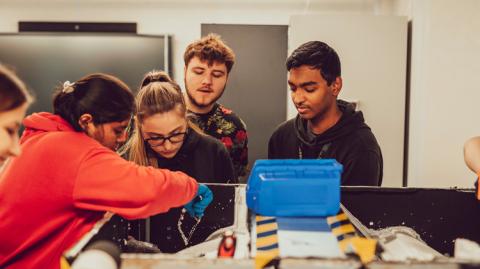Sponsored content: created in partnership with the Engineering and Design Institute London.
Traditionally, a typical week in the life of a university student has contained lectures. Regardless of the year, location and subject of study, lectures have been synonymous with degree qualifications. They can be a great way to communicate important information to students, and many people thrive in a lecture environment. But others struggle to absorb information in this way.
Many universities are now reconsidering the lecture-focused approach to learning, evaluating the efficacy of other learning methods. If you’re trying to decide whether a lecture-based course is the best fit for you, there are some key questions to ask yourself.
Would virtual learning suit you?
When choosing a course, it’s important to think about whether you prefer a structured timetable, or more flexibility. If you’re comfortable planning your own time and aren’t keen on lectures, a university that delivers your course content via a virtual learning environment might be a good fit.
This approach can bring benefits beyond the freedom to decide – within reason – when, where and with whom you study. Working through online modules means you can learn at your own pace and revisit topics you’re struggling with. You’re also more likely to see variety in how course content is delivered, with a mix of written, video and interactive content to help you retain information.
How will you be assessed?
Many courses are assessed through exams, essays or coursework. You’ve probably already experienced these methods enough to know how you perform. You may find that courses that adopt a project-based approach to teaching will place more weight on how well you have applied your knowledge to your practical work. If you experience exam jitters, it’s important to research which assessment methods your courses of interest use.
How much emphasis does the course put on workplace skills?
If you want to go to university because of a deep interest in a certain subject and to focus on that alone, lecture-based courses are a great option. But if building workplace skills is just as important, a course that teaches knowledge through practical application could be a better fit.
Working in groups can help you build important workplace skills such as teamwork, problem-solving, peer analysis, presentation and communication. What’s more, applying your knowledge in a practical way means you can start creating your professional portfolio much earlier in your career, which may help you secure a job faster once you graduate.
Does the teaching on the course replicate the workplace?
The transition from education to the workplace is a big one, and university is often a stepping stone between the two. When you’re looking at courses, think about whether you want university to feel like an extension of school or to prepare you for the world of work. Industry placement opportunities can be a great way to gain work experience while you’re studying.
Once you graduate, you probably won’t come across lectures very often. If you go to a university without them or undertake a placement, your learning environment will more closely replicate industry workplaces. With this experience built into the curriculum, you might develop a better understanding of what employers look for in the graduates they hire, helping you thrive in interviews.
Does the university work with industry partners?
If you want to familiarise yourself with potential employers, find out which courses have industry input. If your university works with industry to design course modules, you’re more likely to meet professionals and expand your network. You can also draw on their knowledge and experience and ask for career advice. Some universities invite industry partners to watch students’ project presentations, where they offer valuable feedback and advice to students about their work.
Many new providers such as the Engineering and Design Institute London (TEDI-London) are exploring how far a university education can step away from traditional methods of teaching and learning.
At TEDI-London, instead of using lectures, engineering is taught through a series of project-based challenges that are designed and delivered with support from industry partners. Students learn in practical makerspaces through projects centred around real-world issues that cover a broad range of engineering specialisms.
When it comes to learning engineering principles and theory, TEDI-London students work through modules via a virtual learning environment instead of attending lectures. They can apply this to their practical, in-person project work.
Everyone’s learning preferences are different, and for some, more traditional methods work. But for others, having the option to study at a university like TEDI-London can be the difference between pursuing a degree and not.
If you’re interested in studying an engineering degree without lectures, find out more about .

Comments